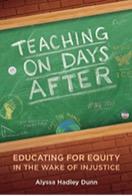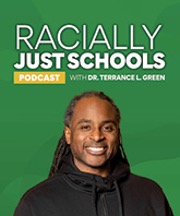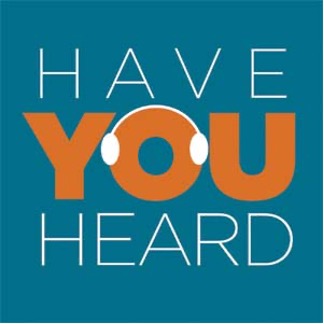For school leaders, summer is the time to relax, recharge, and read. Here, we share our top five picks from the “Syllabus” section of Principal Leadership. Items include books about timely topics in education as well as podcasts that are worth a listen. Be sure to check out new “Syllabus” selections in the September issue of Principal Leadership. In the meantime, happy reading, listening, and learning!
1. Well-Being in Schools: Three Forces That Will Uplift Your Students in a Volatile World

The concept of well-being in schools is hardly new, though it has gained increasing attention. In Well-Being in Schools: Three Forces That Will Uplift Your Students in a Volatile World (ASCD), education scholars Andy Hargreaves and Dennis Shirley provide a nuanced framework for approaching well-being in schools, with attention to both our history of over-testing and standardization and our uncertain future given the pandemic and climate change. Throughout, they discuss an array of questions, such as: “Does the well-being agenda wrongly claim to be able to solve massive social problems with individualistic, psychological solutions?” and “What’s the point of having initiatives in well-being if other parts of the school system are perpetuating ill-being?” Ultimately, they argue for “the Prosperity Doctrine,” which acknowledges that the best approach to student well-being is alleviating wide-scale social inequality, moving away from standardized achievement tests, and reinvesting in education with an emphasis on funding for mental health services. The authors also call for an ethical and thoughtful approach to technology, an increased focus on giving students opportunities to interact with nature, and an acknowledgment that the well-being of adults in schools must be taken as seriously as students’ well-being. At a time when illness is pervasive and stress levels are high, this book provides much-needed insight into the role schools play in the overall health and well-being of society.
2. LGBTQ Youth and Education: Policies and Practices

The second edition of LGBTQ Youth and Education: Policies and Practices (Teachers College Press) is a powerful tool for educators committed to developing the pedagogy, curriculum, and policies to improve school experiences for LGBTQ students and their allies. Author Cris Mayo, an education professor at the University of Vermont, begins his book by explaining what is at stake in terms of LGBTQ students’ physical and mental health, safety, and academic outcomes. He examines how schools have long been sites for controversies over sexuality, a trend which continues today with the onslaught of anti-LGBTQ bills. Mayo also sheds light on the damaging effects of specific school-based policies, including zero-tolerance policies that have led to blanket punishment of LGBTQ students who have stood up for themselves in the wake of relentless harassment. He also documents how extracurricular clubs and programs, such as Gay-Straight Alliances (GSAs), have made school safer for all students.
3. Teaching on Days After: Educating for Equity in the Wake of Injustice

On days after catastrophic events, educators across the country must make important decisions about how to acknowledge students’ questions and concerns. In her new book, Teaching on Days After: Educating for Equity in the Wake of Injustice (Teachers College Press), Alyssa Hadley Dunn, an associate professor of teacher education at Michigan State University, thoughtfully describes how schools can and must create authentic opportunities for students to process, understand, and respond to events including natural disasters, political turmoil, racial injustice, and gun violence. Drawing on interviews with teachers, Dunn shares examples of how educators adapt their curricula in the wake of these events, and many cite the need to have a supportive administration. Perhaps most compelling are the short sections between chapters in which students reflect on their schools’ responses to the shootings at Sandy Hook Elementary and Marjory Stoneman Douglas High School, the Jan. 6, 2021 attack on the U.S. Capitol, the start of COVID-19, and the murder of George Floyd. This book is a valuable resource for school leaders looking to prepare teachers for the task of ensuring that classrooms are safe spaces for students on “days after.”
4. “Racially Just Schools” Podcast

In “Racially Just Schools,” Dr. Terrance L. Green, an associate professor at the University of Texas at Austin and a former high school science teacher, speaks directly to the role of school leaders in creating a school climate that is humanizing, culturally responsive, and academically rigorous for students of color. In each episode, he delves deeply into one topic through candid conversation with leaders in the education field. For example, in #10: “Why We Need a Hard Re-Set in Education,” Green interviews Gloria Ladson Billings, emerita professor in the School of Education at the University of Wisconsin-Madison and creator of the term “culturally relevant pedagogy,” who explains why we need to reimagine how schools are run in the service of equity. Other episodes, such as #4: “How to Practice Culturally Responsive School Leadership,” are geared specifically toward school leaders. In that episode, Green interviews Muhammad Khalifa, a professor of educational administration and the executive director of urban and rural initiatives at The Ohio State University, about what it takes to engage in culturally responsive school leadership. They also discuss specific ideas for engaging with families, as well as structures to provide teachers with the time and resources necessary to build relationships with the communities they serve.
5. “Have You Heard” Podcast

In the podcast “Have You Heard”, journalist Jennifer Berkshire and education historian Jack Schneider engage each other and a long list of experts in discussions on hot-button education issues. As they examine charter school policy, curriculum reform, or the challenges of remote learning, among other topics, they grapple with deep, philosophical questions about the implications of determining how and to what purpose we are educating our nation’s children. For example, in episodes #123 “Schooling the Workforce,” #107 “Learning to Earn,” and #104 “A New Secretary for the Department of Education,” they contend with the age-old trope that education is the great equalizer and ask whether schools can truly serve as our primary pathway for social mobility. In another series of episodes, including #120 “How Pronouns Became Landmines: The Conservative War on Trans Youth” and #113 “The K–12 Culture Wars,” they ask important questions about who should get to decide what happens in schools, and they examine how schools play a role in determining representation in democratic systems. In addition to being informative and thought-provoking, this podcast is humorous and engaging.

2 Comments
Thank you,wonderful article
Excellent article with several great references. Thank you!